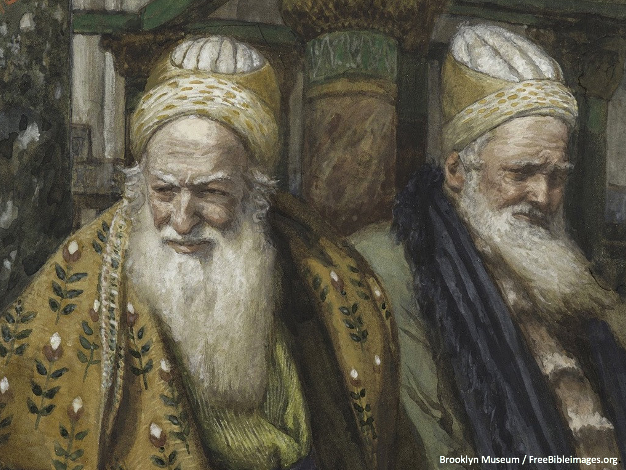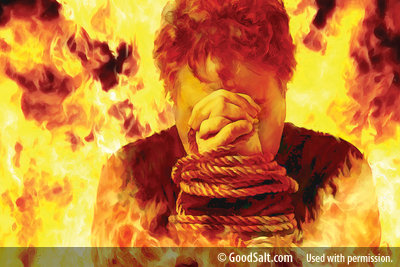All of us have experienced failure in our lives. Perhaps you embarrassed yourself by forgetting the name of the person you were talking to or the friend you meant to introduce. Maybe you missed the catch for the final out in a baseball game or you forgot the crucial line in a school play. Some of us may have lost a wedding ring or engagement ring never to be recovered. After making a mistake, how do you respond? Did you beat yourself up? Did you feel remorse or apologize, if applicable? Or do you blame someone else for your mistakes? How long does it take you to get over a mistake?
As we talk about making mistakes, I am reminded of a conversation between a pastor and a lawyer. The pastor asked the lawyer, “Sir, do you ever make mistakes in pleading?” “I do,” replied the lawyer. “And what do you do with mistakes?” inquired the pastor. “Why, I mend them, if large ones. If small ones, I let them go. And I pray, sir.” The lawyer continued by asking, “Do you ever make mistakes in preaching?” “Yes, sir, I have,” replied the pastor. “What do you do with your mistakes?” asked the lawyer. “Why, sir, I dispose of them in the same manner as you do. Not long ago when I was preaching, I meant to observe that the devil was the father of liars, but I made a mistake and said the father of lawyers. The mistake was so small that I let it go.”
All of us have experienced failure in our Christian lives. That is a reality. How we respond to failure can determine the direction we move from that point on. We can move forward or backward in our Christian lives.
Starting today, we are going to look at two kinds of responses to Christ crucified in John 18:13-27 over the next few days. One response will teach us about failure – factors that contribute to it and how to overcome it. The other response will teach us about how to handle the hatred of religious people toward Christ crucified. The events of John 18:13-27 are like a drama presented on two stages. Stage one is presented first (John 18:13-14) while the action on stage two takes place (John 18:15-18). Then the action shifts back to stage one (John 18:19-24) and then returns to stage two (John 18:25-27).
In these verses we are going to discover some things that took place during the final hours of Jesus’ life before He was crucified. Christ has already been arrested by the Roman soldiers and Jewish temple guards (John 18:12). He now must face the first of six trials. Three would be religious trials: one before Annas (John 18:12-14, 19-23), one before Caiaphas (Matthew 26:57-68), and one before the Sanhedrin (Matthew 27:1-2). And there would be three Civil Trials: One before Pilate (John 18:28-38), one before Herod (Luke 23:6-12), and one before Pilate (John 18:39-19:1). 1
“And they led Him away to Annas first, for he was the father-in-law of Caiaphas who was high priest that year.” (John 18:13). After Jesus was arrested by the Roman soldiers and Jewish temple officers, He was led back across the Kidron Valley into the city of Jerusalem to appear before the religious authorities. It seems as though there are two high priests in this section (cf. John 18:13, 19, 24). But understanding the historical background will help to explain this observation.
According to the Mosaic Law, the high priest was the most important member of the Jewish community because he was the only one authorized by God to offer sacrifices for the sins of the community on the Day of Atonement (Exodus 30:10; Leviticus 16). 2
According to Jewish law, the high priestly office was to be lifelong and hereditary. But during King Herod’s rule, the high priest was frequently dismissed and replaced because the Romans didn’t like the concentration of power in one person.
But because the Jews believed the office of high priest was lifelong, the high priest retained a good measure of power and prestige among the Jewish population even after removal from office. 3 Such was the case with Annas. He “had been appointed high priest by Quirinius, governor of Syria, in A.D. 6 and remained until he was deposed by Valerius Gratus, procurator of Judea, in A.D. 15. According to the Jewish law the high priestly office was for life, but the Romans did not like the concentration of power in one person so they frequently changed high priests.” 4
Because the office of high priest is lifelong, it is not surprising that the matter of Jesus’ arrest and trial was first brought to Annas, the father-in-law of Caiaphas, the high priest officially recognized by the Roman authorities. Annas was a very powerful man. So great was his influence that eventually five of his sons, as well as his son-in-law and grandson, became high priests. 5 The Jews virtually regarded him as a high priest, although Caiaphas held the title officially.
Annas was also very wealthy. He owned the famous Bazaars of Annas, which ran a monopoly on the temple sale of animals for sacrifices and the stalls of the money-changers. 6 Twice Jesus had cleansed the temple, once at the beginning of His ministry (John 2:13-22) and again at the end of His ministry (Matthew 21:12-16; Mark 11:15-19; Luke 19:45-47). From the day of the first cleansing of the temple, Annas hated Jesus. Now at last he has Jesus in his power.
To Annas “was the task assigned of the preliminary hearing of the urgent case under consideration. This preliminary hearing took place in one of the apartments of the high priest’s palace, a large building surrounding a central court, designated for the uses of Annas, whose residence was in another part of the city, between the Tyropoean valley and the upper city.” 7
Ironically, the Jewish religious leaders begin to break law after law with their various trials even though they are trying Jesus for not keeping the law. “Some of the main problems with the trial of Jesus include the following.
“1. There Was No Possibility Of A Fair Trial. To begin with, the Sanhedrin should have never held the trial. They had plotted to kill Jesus ahead of time. Consequently they were hardly in a position to render a fair verdict as to his guilt or innocence. This is especially true of the High Priest Caiaphas. He is the one who said that it was necessary for Jesus to die for the entire nation. The High Priest was the supreme judge in Israel. It was his responsibility to see that a person be given a fair trial. At the very least, he should have not participated in trial in any manner. Yet he was the driving force behind the arrest and trial of Jesus. Therefore there was no possibility that Jesus could have been given a fair trial.
“2. A Capital Trial At Night Was Illegal. It was illegal to try capital cases at night. By doing so the Sanhedrin broke the law. When a person’s life was at stake the trial could only be held during the day.
“3. They Should Not Have Looked For Witnesses After The Trial Started. According to Jewish law, a trial starts when witnesses come forward to testify. The Sanhedrin should not have gone out to look for witnesses. The witnesses come first, then the trial.
“4. They Should Not Have Looked For False Witnesses. Not only should the Sanhedrin have not looked for witnesses, they certainly should not have looked for false witnesses if Jesus were to be given a fair trial. The verdict, of course, was never in doubt.
“5. The False Witnesses Should Have Been Punished. Since the Sanhedrin knew the testimony of the witnesses was false, these witnesses, according to Jewish law, should have been punished. The fact that they were not is another illegality.
“6. The Judgment Should Have Been Delayed Till Next Day. In capital cases, judgment was to be delayed until the next day. The fact that they pronounced judgment immediately is another sign of the illegal nature of the trial.
“7. There Is Not Supposed To Be A Trial On Day Before The Sabbath Or Before Holy Days. Since the judgment in a capital case could not be rendered until the next day, it was illegal to try someone on the day before the Sabbath or before some holy day. During the Sabbath day or holy day there could be no legal meeting of the Sanhedrin. Consequently the timing of the trial was also illegal.
“8. They Never Considered Jesus’ Testimony. There is also the problem of Jesus’ testimony. When Jesus was put under oath he acknowledged that he was the Messiah – the promised Deliverer. This admission of Jesus was what caused the Sanhedrin to cry out that he was guilty of death. However, they never stopped to consider the possibility that Jesus was telling the truth. There was not the slightest interest in attempting to find out whether Jesus may indeed be the promised Messiah. There was no evidence that was allowed to be given on Jesus’ behalf and they weighed no evidence before making their judgment.
“Conclusion: When all the facts are weighed it becomes clear that those who tried Jesus on that night were not interested in giving him a fair trial. The verdict had been determined ahead of time. They only went through the motions of the appearance of a fair trial. Jesus was illegally and wrongfully tried… Therefore when all the facts are considered we conclude that Jesus’ trial was the greatest injustice in all of history.” 8
When you study the trials that Jesus faced, Christ looks more and more innocent and those who were trying Him looked more and more guilty. These were trials that proved the innocence of the accused and the guilt of the accusers. They were unfair in every way. Yet John informs us in the next verse, “Now it was Caiaphas who advised the Jews that it was expedient that one man should die for the people.” (John 18:14). The apostle alludes to Caiaphas who unknowingly prophesied that Jesus would need to die for the people. This verse indicates what can be expected as the outcome of the trials. The outcome was certain. Events would lead rapidly to Jesus’ death. It is doubtful Caiaphas meant spiritual benefits “for” the people, but rather political and monetary benefits “for” the nation’s leaders. Nonetheless, God was in control and would use these unfair religious and civil trials to bring about the means of salvation through the death of His Son.
Do you get upset when life is unfair like this? When things are not handled fairly there is something inside us that stirs our anger. Especially those of us who have grown up in America. There is something about the American spirit, the Bill of Rights, and all those things that just burns us up when life is not fair. But notice that God took an unfair trial, held by unrighteous people, and used it to accomplish His perfect will – Jesus going to the cross to die for our sins. We can easily get so focused on what is fair in America that we conclude that God has lost control. We need to remember that somebody can treat us unfairly but it doesn’t keep God from treating us righteously.
This leads to our first principle: We can overcome religious hatred when we REALIZE LIFE IS NOT ALWAYS FAIR, BUT GOD ALWAYS IS (John 18:13-14). Let’s not forget this. The truth is life is not fair. Jesus did not deserve to be on trial. He lived a perfect life on earth because He was and is God (John 1:1; 2 Corinthians 5:21; Hebrews 4:15; I Peter 3:18; I John 5:20). If life was not fair for the perfect Son of God, why would we expect life to be fair when we are imperfect sinners!?!
“The world is anything but a fair place. A young man in the prime of his life is killed by a drunk driver who walks away without a scratch. Drug dealers and pornography peddlers make millions of dollars and live in mansions. A less qualified applicant gets the job. The best runner is tripped from behind by another and loses the race. Our response is, ‘It isn’t fair,’ as if labeling it that way somehow changes things. King Solomon, perhaps the wisest man of all time, understood life’s unfairness when he noted, ‘There is something else meaningless that occurs on earth: the righteous who get what the wicked deserve, and the wicked who get what the righteous deserve. This too, I say, is meaningless.’ (Ecclesiastes 8:14).” 9
But we need to remember that when life is not fair, God is always fair toward us. “If God is not just, He isn’t God and can’t be in control of everything. If God ever once unfairly disciplined or punished a person, it would disqualify Him as God and mean that He is not in control of everything. We see miscarriages of justice all the time here on earth, but there is never a miscarriage of justice with God. We can never honestly say to God that He didn’t handle something fairly or right.” 10 Why? Because only God has all the information about a situation. He is all-knowing and fair, but we are not. So none of us are in a position to critique the God of the universe.
When the books are not being balanced in this world we need to remember this is not where the books are balanced anyway. Heaven will determine the balancing of the books. 11 God will make everything right in His time. His judgment of the world will be fair. He will judge everyone according to their works (Romans 2:5-11). For the unbeliever, God will judge him or her according to their works to determine their degree of punishment in the lake of fire at the Great White Throne Judgment (Revelation 20:11-15). For the believer in Jesus Christ, God will judge him or her according to their works to determine the degree of their rewards in Christ’s coming Kingdom at the Judgment Seat of Christ (I Corinthians 3:8-15; 2 Corinthians 5:9-11; Revelation 22:12). God will make things right in His time.
Embracing this truth that life is not fair, but God always is, can give us peace when we are treated unfairly. Just as Jesus “committed Himself to Him who judges righteously” when He was unfairly treated by His enemies (I Peter 2:23), so we can do the same when we face unjust situations, knowing that God is fair and He will bring our enemies to justice one day (cf. 2 Thessalonians 1:3-10; Revelation 15:3-4; 16:5-7; 20:11-15).
Prayer: Lord Jesus, You know what it is like to live in a world that is not fair. Sometimes we let that world bring us down. We see how the world tolerates people who embrace its values, but it hates Christians who live out Your values. It is not fair. But You never promised us that the world would be fair to us. Lord, help us not to forget Who You are and Who You want to be in our lives and in our world. Lord Jesus, thank You for reminding us that in the future You will balance the books and bring justice to this unfair world. Knowing this enables us to live peacefully even when we are treated unfairly. Remind us that no matter how powerful human institutions around us might seem or people in our lives might seem, in comparison to You, all human power looks feeble and foolish. You are the Lord that we need. You are the King that we need. We worship You as the Lord and King. We need You, Jesus. We thank You for being in our lives. In Your powerful name we pray. Amen.
ENDNOTES:
1. Louis A. Barbieri, Jr., The Bible Knowledge Commentary Gospels, Editors John F. Walvoord and Roy B. Zuck, (David C Cook, 2018 Kindle Edition.), pg. 157.
2. J. Carl Laney, Moody Gospel John Commentary (Chicago: Moody Press, 1992), pg. 320.
3. Ibid.
4. Edwin A. Blum, The Bible Knowledge Commentary Gospels, Editors John F. Walvoord and Roy B. Zuck, (David C Cook, 2018 Kindle Edition.), pp. 682-683.
5. Laney, pg. 321.
6. J. W. Shepard, The Christ of the Gospels (Grand Rapids: Eerdmans, 1946), pp. 573-575.
7. Ibid.
8. Don Stewart’s article, “Did Jesus Receive a Fair Trial?” at https://www.blueletterbible.org/faq/don_stewart/don_stewart_250.cfm.
9. Chris Thurman, The Lies We Believe (Thomas Nelson, 2019 Kindle Edition), pp. 83-84.
10. Chris Thurman, The Lies We Believe about God: Knowing God for Who He Really Is (David C Cook, 2017 Kindle Edition), pg. 86.
11. Tom Holladay’s sermon on Wednesday, July 17, 1996, entitled, “Jesus on Trial.”





